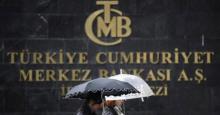Central banks
Turkish Central Bank revises up inflation outlook, signals unorthodox policy to go on
Turkey's Central Bank bank governor signaled on Jan. 31 that its unorthodox steps to manage sharp falls in the Turkish Lira were working and would continue until the inflation outlook shows a significant improvement.
Eurozone consumer confidence index hits 5-year high
Consumer and business confidence in the Eurozone rose to 108.2 points in January, the European Commission has announced. This is the largest increase since March 2011, sparking talks on the policy of quantitative easing and a subsequent rise in inflation at the end of 2016, leading some pundits to argue it should be railed in.
IOBE: Growth won't make budget target in 2017
The delay in the completion of Greece's second bailout review will inflict a blow on economic growth this year, which will underperform the government's expectations, the Foundation for Economic and Industrial Research (IOBE) argues in its quarterly report released on Thursday.
- Read more about IOBE: Growth won't make budget target in 2017
- Log in to post comments
ECB: Trump’s protectionist economic policies a bad idea
Member of the European Central bank’s (ECB) executive board Benoit Coeure responded to US President Donald Trump that the adoption of a protectionist economic policy would be a bad idea.
As Tsakalotos seeks to restart review, PM must keep lid on SYRIZA dissent
Finance Minister Euclid Tsakalotos is bracing for a Eurogroup summit on Thursday where he is expected to present a set of concessions on thorny issues that have stalled bailout negotiations in a bid to restart the review so the prospects for debt relief and inclusion in the European Central Bank's quantitative easing program return to the table.
Nothing more critical than Central Bank credibility: Turkish deputy PM
The Central Bank will do what is "necessary" on interest rates, Turkish Deputy PM Mehmet Şimşek has said at the World Economic Forum in Davos, adding that nothing was more critical than its credibility.
Clouds gather as bailout review hangs in balance
The protracted delay in wrapping up the country' bailout review is beginning to take a heavy toll on the government's plan of action for putting the country on the path to economic recovery.
- Read more about Clouds gather as bailout review hangs in balance
- Log in to post comments
QE a distant hope for Greece
Greece's entry into the European Central Bank's quantitative easing (QE) program keeps getting put off, just as criticism is mounting over the effectiveness of the bond-buying program and the potential legal hazards for Frankfurt - concerns that are doing nothing to make it easier for the country to get on board.
- Read more about QE a distant hope for Greece
- Log in to post comments
Greek banks' ELA cap declines
The European Central Bank lowered the cap on emergency liquidity assistance (ELA) Greek banks draw from the domestic central bank by 4.2 billion euros to 46.5 billion euros, the Bank of Greece said on Thursday.
The move reflected improving liquidity conditions and the stabilization of private sector deposit flows, it said.
The ELA ceiling is valid up to February 1.
- Read more about Greek banks' ELA cap declines
- Log in to post comments
NBS says price, financial stability among its 2016 results
BELGRADE - By pursuing an efficient monetary policy and implementing timely measures, the National Bank of Serbia (NBS) achieved price and financial stability in 2016 amid pronounced volatility and uncertainty in the international environment, the NBS said in an end-year recap.
The results reflect the continuation of efforts and committed work over the past four years, it said.










